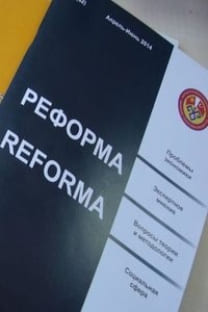COVID-19 PANDEMİSİNİN KIRGIZİSTAN’DAKİ HANEHALKINA EKONOMİK ETKİLERİ
Covid-19 pandemisinden dolayı tüm dünyada ekonomik durgunluk ve gerilemeler yaşanmaktadır. Hem ülkelerin birbiriyle olan ekonomik ilişkilerinin zayıflaması, hem de karantin uygulamaları bu durgunluğu daha da tetiklemektedir. Resmi verilere göre 2020’de Kırgızistan ekonomisi %8,6 oranında gerileme yaşamıştır ve aynı zamanda fiyatlar genel düzeyi %9,7’ye artmıştır. Tüm bunlar genel olarak insanların refah düzeyini olumsuz etkilemektedir. Kırgızistan’da pandeminin hanehalkına olan bu ve benzeri etkilerini incelemek amacıyla 2021 yılının Şubat, Mart aylarında ülkenin tüm bölgelerinden katılımcılara online anket uygulanmış, toplam 447 anket elimize ulaşmıştır. Anket sonuçlarına göre, % 31.1’i borç veya kredi aldıkları, % 30’unun tüketimi azalmışken, % 32.2’sinin ise tüketimi arttırdığı ve % 59’unun tasarruflarını azaldığı tespıt edilmiştir. Harcama türlerine bakıldığında, giysi ve ayakkabı harcamaları, ulaşım ve beyaz eşya harcamaları ciddi bir şekilde azalırken, gıda, temizlik maddeleri, iletişim ve sağlık harcamaları önemli derecede artış göstermiştir. Ekonomik ve sosyal istikrarlığın sağlanması açısından hanehalkının finansal okuryazarlığının yükseltilmesi ve devletin de fakirliği azaltıcı sosyal harcamalarının arttırılması gerekmektedir.
Anahtar Kelimeler:
Covid-19 pandemisi, ekonomik etkiler, ekonomik istikrar
ECONOMİC EFFECTS OF COVİD-19 PANDEMİC ON HOUSEHOLDS İN KYRGYZSTAN
Due to the Covid-19 pandemic, economic recessions and recessions are experienced all over the world. Both the weakening of the economic relations of the countries with each other and the quarantine practices triggered this stagnation. According to official data, the economy of Kyrgyzstan experienced a decline of 8.6% in 2020, and at the same time, the general level of prices increased to 9.7%. All of these have a negative impact on people's well-being. In order to examine economic effects of the pandemic on households in Kyrgyzstan, an online survey was applied to participants from all regions of the country in February and March 2021, and a total of 447 surveys were received. According to the results of the survey, it was determined that 31.1% of them borrowed, while 30% of them decreased their consumption, 32.2% of them increased their consumption and 59% of them decreased their savings. At the same time, expenditures on clothing and shoes, transportation and household appliances substantially decreased significantly, while expenditures on food, cleaning materials, communication and health increased significantly. In order to ensure economic and social stability, it is necessary to increase the financial literacy of the households and to increase the social expenditures of the government to reduce poverty.
Keywords:
Covid-19 pandemic, economic effects, economic stability,
___
- Liu T., Pan B. & Yin Zh. Pandemic, Mobile Payment, and Household Consumption: Micro-Evidence from China, Emerging Markets Finance and Trade. – 2020. – No 56:10. – P. 2378-2389. DOI: 10.1080/1540496X.2020.1788539
- Yue P., Korkmaz A.G. & Zhou H. Household Financial Decision Making Amidst the COVID-19 Pandemic, Emerging Markets Finance and Trade. – 2020. – No 56:10. – P. 2363-2377. DOI: 10.1080/1540496X.2020.1784717
- Li J., Song Q., Peng Ch. & Wu Y. COVID-19 Pandemic and Household Liquidity Constraints: Evidence from Micro Data, Emerging Markets Finance and Trade. – 2020. – No 56:15. – P. 3626-3634. DOI: 10.1080/1540496X.2020.1854721
- Janssens W., Pradhan M., De Groot R., Sidze E., Donfouet H.P.P., Abajobir A. (). The short-term economic effects of COVID-19 on low-income households in rural Kenya: An analysis using weekly financial household data. – 2020. – World Development 138 (2021) 105280.
- Beck K., Chiu H.H. & Timmerman I. Lower-income college student adjustments to COVID-19 // Applied Economics Letters. – 2020. DOI: 10.1080/13504851.2020.1855310
- Prabheesh K. P. Dynamics of foreign portfolio investment and stock market returns during the COVID-19 pandemic: Evidence from India // Asian Economics Letters 1:2. – 2020. DOİ:10.46557/001c.17658.
- Sharma S. S. A note on the Asian market volatility during the COVID-19 pandemic // Asian Economics Letters 1:2. – 2020. DOİ:10.46557/001c.17661.
- Zhang D., Hu M. & Ji Q. (). Financial markets under the global pandemic of COVID-19. // Finance Research Letter 36:1–6. – 2020. DOİ:10.1016/j.frl.2020.101528.
- Han J., Meyer B. D. & Sullivan J. X. Income and poverty in the COVID-19 pandemic // NBER Working Paper Series. – 2020. DOİ:10.3386/w27729.
- Coibion O., Gorodnichenko Y. & Weber M. The cost of the Covid-19 crisis: Lockdowns, macroeconomic expectations, and consumer spending // NBER Working Paper Series. – 2020. DOİ:10.3386/w27141.
- Romer C. The Great Crash and the Onset of the Great Depression // Quarterly Journal of Economics. – 1990. – No 105(3). – P. 597–624. DOİ:10.2307/2937892.
- ISSN: 1694-5158
- Yayın Aralığı: Yılda 2 Sayı
- Başlangıç: 1999
- Yayıncı: Kırgızistan Türkiye Manas Üniversitesi
Sayıdaki Diğer Makaleler
THE IMPACT OF THE SECURİTİES MARKET ON ECONOMİC GROWTH. CAUSALİTY ANALYSİS
BLOCKCHAIN TEKNOLOJİSİNİN ÇEVRESEL ETKİLERİNİN DEĞERLENDİRİLMESİ
KIRGIZİSTAN DIŞ POLİTİKASINDA TÜRKİYE İLE İLİŞKİLERİNE GENEL BAKIŞ
HYSTERESIS IN UNEMPLOYMENT: KYRGYZSTAN CASE
Akak SHARSHENKADYROVA, Damira BAİGONUSHOVA
COVID-19 PANDEMİSİNİN KIRGIZİSTAN’DAKİ HANEHALKINA EKONOMİK ETKİLERİ
Junus GANİEV, Razia ABDIEVA, Damira BAIGONUSHOVA
IMPACT OF THE COVID-19 PANDEMIC ON THE SOCIO-ECONOMIC DEVELOPMENT OF KYRGYZSTAN
